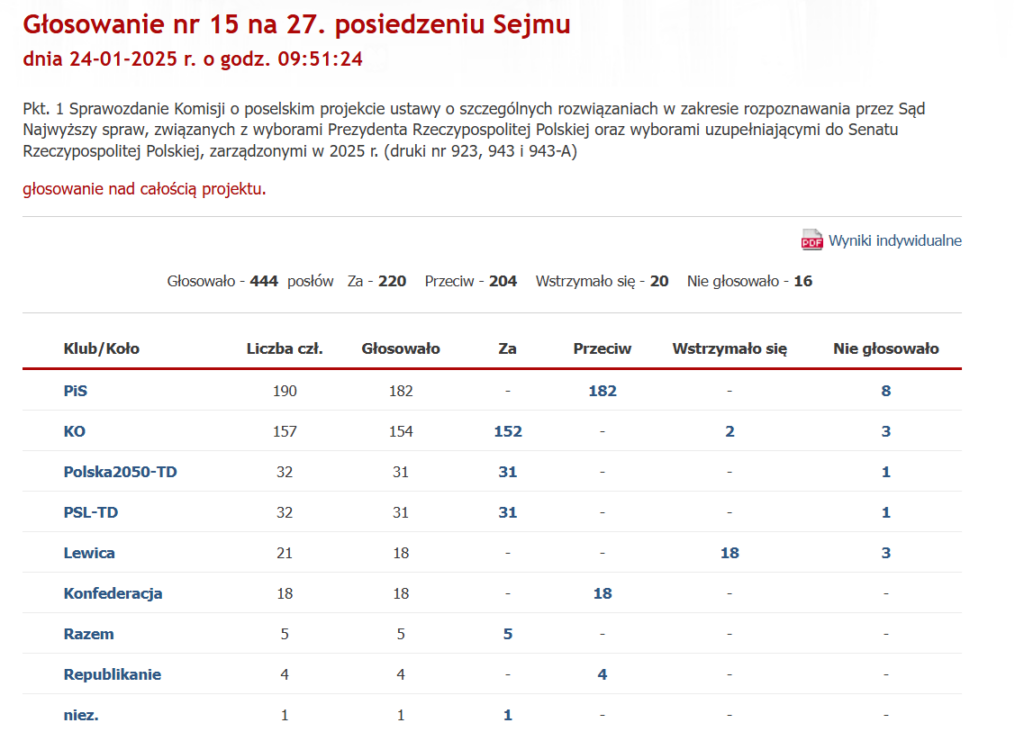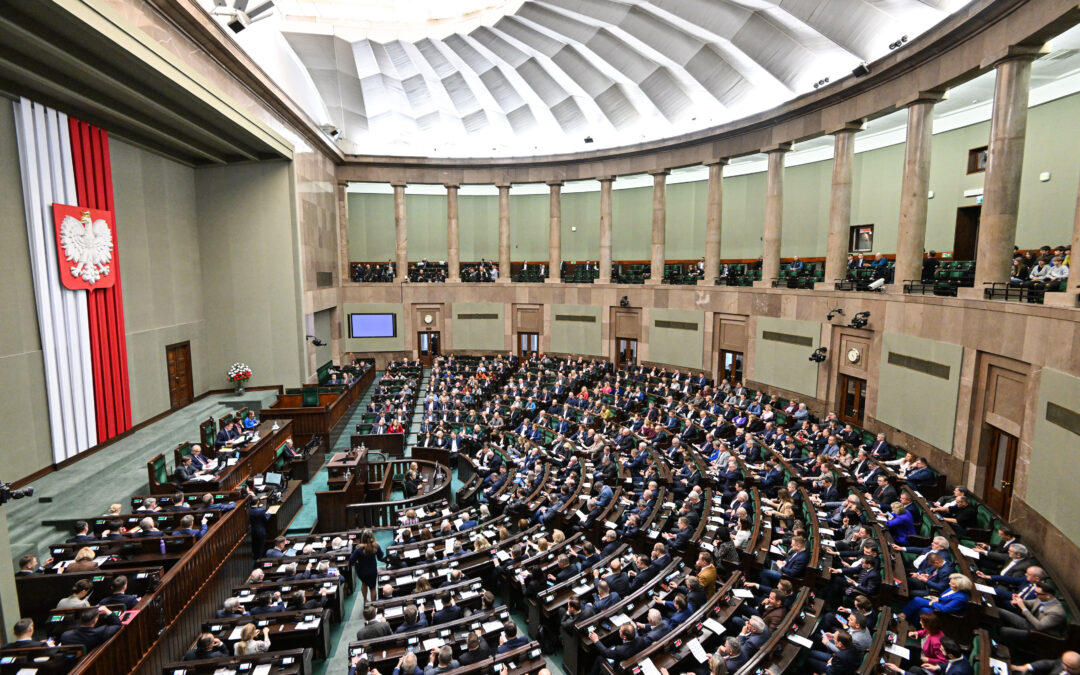Keep our news free from ads and paywalls by making a donation to support our work!

Notes from Poland is run by a small editorial team and is published by an independent, non-profit foundation that is funded through donations from our readers. We cannot do what we do without your support.
Poland’s parliament has passed a bill that will allow the validity of this year’s presidential election result to be decided by the 15 judges who have served the longest in the Supreme Court.
Previously, that decision was made by the Supreme Court’s chamber of extraordinary review and public affairs, which was created as part of the former Law and Justice (PiS) government’s judicial reforms.
However, that chamber is regarded as illegitimate by Poland’s current government and by the European Court of Justice (ECJ) because it is staffed by judges appointed through the National Council of the Judiciary (KRS), a body that was brought under political control during PiS’s time in power.
The legislation was strongly opposed and criticised by PiS, who claimed that such a change would be “unconstitutional”, while the head of the office of President Andrzej Duda, a PiS ally, has already stated that “no serious justification can be seen for such changes”.
❗️Sejm uchwalił ustawę o szczególnych rozwiązaniach w zakresie rozpoznawania przez Sąd Najwyższy spraw związanych z wyborami Prezydenta Rzeczypospolitej Polskiej oraz wyborami uzupełniającymi do Senatu Rzeczypospolitej Polskiej zarządzonymi w 2025 r.
📝Szczegóły prac… pic.twitter.com/XfKQzWx0eQ
— Sejm RP🇵🇱 (@KancelariaSejmu) January 24, 2025
The draft law, approved by the Sejm, the lower, more powerful house of parliament, envisions selecting the 15 longest-serving judges of the Supreme Court to decide on the validity of the outcome of the upcoming presidential election on 18 May and the supplementary elections to the Senate, the upper house of parliament.
Meanwhile, protests and appeals against the decisions made in connection with the presidential election by the National Election Commission (PKW), which is charged with overseeing the electoral process, are to be heard by the Supreme Court with a panel of three judges drawn from among those 15.

The bill was drafted and presented by representatives of Third Way (Trzecia Droga), a group in the ruling coalition composed of the agrarian, centre-right Polish People’s Party (PSL) and the centrist Poland 2050 (Polska 2050).
It has been approved with 220 MPs – mostly from the ruling coalition – voting in favour. 204 MPs voted against and 20 abstained. Before the vote, the Sejm refused a motion by PiS to reject the bill in its entirety.
The Left (Lewica) – also a member of the ruling coalition – abstained from voting. The votes against came from two opposition parties, PiS and the right-wing Confederation (Konfederacja), all of whose MPs present at the vote opposed the bill.
“The legislation allows us to avoid a situation in which anyone, for any political reasons, could challenge the outcome of the election,” explained PSL MP Michał Pyrzyk, quoted by news website Wirtualna Polska.
However, the idea was met with criticism from the opposition, who claimed that such a change would be “unconstitutional”.
“The bill violates several fundamental principles expressed in the constitution and the principle of citizen’s trust in the state and the law made by the state,” said PiS MP Marek Ast, quoted by news website Bankier.pl before the vote. “It differentiates between judges and undermines the exclusive prerogative of the president to appoint judges.”
💥 Najnowsza wersja ustawy „incydentalnej” i trójpodział władzy „tak jak oni go rozumieją”:
Politycy większości rządowej chcą
❗️ręcznie wskazać skład sądu orzekającego o ważności wyborów❗️Ma to być 15 najstarszych stażem sędziów Sądu Najwyższego. Wśród nich – członkowie PZPR,… pic.twitter.com/kXb5R1S6ue
— 🇵🇱 Paweł Jabłoński (@paweljablonski_) January 22, 2025
Initially the planned reforms envisioned having the whole Supreme Court – excluding the disputed chamber of extraordinary review and public affairs – decide on the validity of the election result, but in the end Third Way’s proposal to select the 15 longest-serving judges was chosen.
Confederation had earlier proposed an amendment for the entirety of the Supreme Court, including the disputed chamber, to decide on the matter. That proposal was accompanied by accusations from PiS and Confederation that 12 of the 15 judges suggested by the coalition had begun their careers under communism.
In response defence minister Władysław Kosiniak-Kamysz, quoted by broadcaster TVN24, stated that “calling all those who have been educated [during communism]… as post-communists or communists is unfair, deceitful, insulting”.
Meanwhile, Paweł Śliz, the Poland 2050 MP responsible for the draft bill, pointed out that eight of those judges had been personally appointed by the late President Lech Kaczyński, who was aligned with PiS and co-founded the party.
More Poles (35%) think that the rule of law has got worse under Tusk's government than believe it has improved (24%).
A further 28% think there has been no change, finds a new poll https://t.co/KkiuY2vDSW
— Notes from Poland 🇵🇱 (@notesfrompoland) January 5, 2025
The draft legislation also met with criticism from The Left, which envisions a longer-lasting solution that would address the issue in all future elections and regulate once and for all the status of the Supreme Court and its chambers.
Meanwhile, all proposals were criticised by Małgorzata Manowska, the chief justice of the Supreme Court and herself a PiS appointee, who told the Rzeczpospolita daily that she does “not see any grounds for circumventing existing legislation and seeking new solutions”.
A chamber of the Supreme Court created by the former PiS government is "not a tribunal established by law", the EU's top court has found.
The same chamber is due next month to rule on the validity of the recent elections at which PiS lost power https://t.co/gXgHSobD8C
— Notes from Poland 🇵🇱 (@notesfrompoland) December 22, 2023
The bill will now go for approval to the Senate, which is controlled by the ruling coalition and is likely to approve it. It will then be passed onto President Andrzej Duda’s desk who can either sign it into force or veto it.
Duda, who is aligned with PiS, has in recent months vetoed various legislation proposed by the ruling coalition and may oppose this bill as well. “No serious justification can be seen for such changes,” Małgorzata Paprocka, head of the president’s office, told TVN24.
Poland’s presidential election will take place on 18 May 2025. If no candidate wins over 50% of the vote, a second-round run-off between the top two will take place on 1 June.
If a ruling coalition candidate wins the election, it would facilitate the passing of new legislation by the government. If an opposition candidate wins, it would likely continue the current issues of cohabitation.

Notes from Poland is run by a small editorial team and published by an independent, non-profit foundation that is funded through donations from our readers. We cannot do what we do without your support.
Main image credit: Fot. Anna Strzyżak / Kancelaria Sejmu

Agata Pyka is a former assistant editor at Notes from Poland. She specialises in Central and Eastern European affairs, cybersecurity, and investigative reporting. She holds a master’s degree in political communication from the University of Amsterdam, and her work has appeared in Euractiv, the Balkan Investigative Reporting Network (BIRN), and The European Correspondent, among others.



















